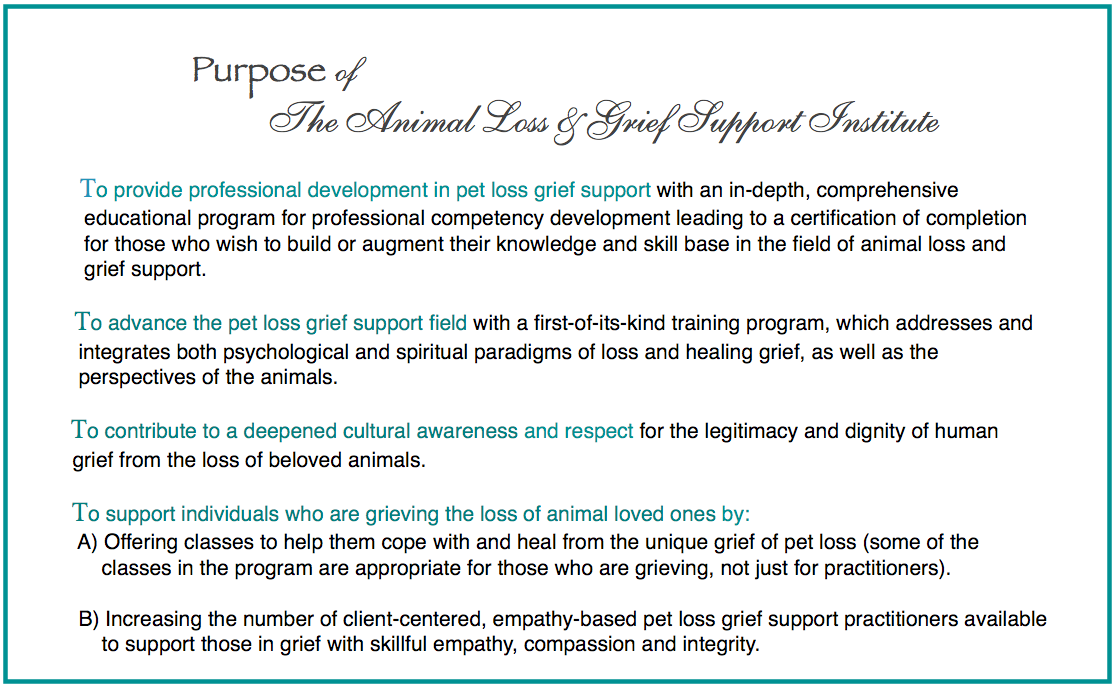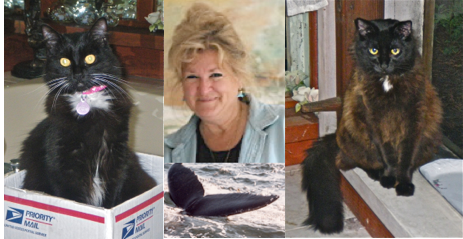How the Program Came to Be
Program Founder, Teresa Whalen
Advisory Board
How This Pet Loss Grief Support Program Came to Be : Notes from Teresa Whalen (formerly Wagner)
What initially inspired the development of this program was my own experience with pet loss, as is the case with so many books and careers in this field. When I experienced my first loss of an animal loved one as an adult, it felt like the end of the world. It was in a way—the end of my world as I knew it with him in it. I loved (and still love) this cat with all of my being, and felt a love from him like no other love I had ever experienced at that time. When he died, I was filled with such searing pain I thought I might die. Shattered by the grief, I also had no paradigms, theories or tools to understand it. Even with my training as a therapist, I found very few pet loss grief support resources to draw from at the time. What was written or voiced in the early 1980’s about the unique grief of losing beloved animals was scant at best.On the contrary, what did exist spoke condescendingly of “pet loss as practice for the real loss of losing a human”—very clearly treating it as a not-as-important type of loss. Reading such things, and noticing how others around me saw me as odd for loving and grieving so deeply for an animal, I began to wonder if something might be wrong with me.
After a time, however, I got impatient and angry with the prevailing narrow and prejudicial view of the human-animal relationship, and returned to the truth and wisdom of my own soul: that the love between animals and humans is very real, that our grief when they die is very real, and that both are as legitimate as humans loving humans, and humans mourning humans. After finding my way through the pain of this loss with the help of an excellent therapist (who, incredibly for the time, held no judgment of the depth of my love for animals or my grief), and learning some powerful emotional and spiritual lessons in the process, I was motivated to offer help to others who might feel alienated and in pain from the loss of their animals.
I got impatient and angry with
the prevailing narrow and prejudicial
view of the human-animal relationship,
and returned to the truth and wisdom
of my own soul: that the love between
animals and humans is very real, that
our grief when they die is very real,
and that both are as legitimate as
humans loving humans,
and humans mourning humans.
So, I read every book I could find on grief, studied with Kubler Ross, Stephen Levine, and John James of the Grief Recovery Institute and integrated the expert’s work about human loss with my training as a therapist and the learnings of my own heart about the uniqueness of losing deeply beloved animals. In 1986, I began to offer pet loss grief support groups, grief counseling and workshops, and later created the Legacies of Love audio book and other grief support resources. Since then, I have worked with thousands of people grieving the loss of their animals in workshops and in individual grief counseling and animal communication consultations. It has become one of my greatest life passions to help others through this typically very disenfranchised loss, and to help educate others to provide pet loss grief support with confidence and competence.
Working with pet loss clients for over three decades, I’ve heard more stories that I can count about hurtful and ignorant things others have said to them about their loss. Though disturbed by the unnecessary pain my clients were enduring, I came to realize that many professionals who regularly come in contact with those who lose beloved animals (veterinary professionals, animal communicators and other healing arts practitioners) are rarely trained in basic counseling skills and grief counseling skills as part of their education in their fields. It is clear from the stories my clients tell me that even some mental health professionals, who are trained in counseling, tend to buy into the harmful and baseless prejudice that humans should not love or grieve for animals as much as they love and grieve for humans. The examples below are real and representative of hundreds of similar accounts clients have reported to me about their interactions with professionals they have hired:
It’s not normal to love your dog as family. Don’t you think it’s time to find a husband and start a real family? (from an energy healer)
It’s not really your cat your are grieving for. Your cat’s death just triggered your real grief of losing your father when you were so young. That’s what you need to work on. (from a therapist)
Your animal’s soul is soaring and whole in the spirit world. There is no need for grief. Feel the joy of your animal and don’t get entangled with unnecessary energies like grief. (from an animal communicator)
I am so sorry for your loss. I know how much you loved her and advise you to get another cat as soon as possible which will shorten your grieving time. (from a veterinarian)
Continually hearing about such judgmental, condescending and psychologically misinformed comments heaped upon my emotionally vulnerable clients was breaking my heart. These practitioners were adding to the disenfranchisement of pet loss and imposing their own limited, erroneous beliefs on their clients which, rather than providing quality pet loss grief support to help them heal, the comments retarded their healing. After ten years of hearing such stories, I decided to attempt to do something about it. I designed a class called Grief Support Skills—Effectively Helping Others Through Animal Loss. The first classes were sponsored by The Assisi International Animal Institute.
I am enormously grateful for what
I’ve learned from my students
and clients—both human and
animal—who’ve trusted me with their stories of personal pain and growth. Without them, I would have only intellectual knowledge and my own personal experiences and views. With them, and only because of them, whatever I have come to know and share with others comes together into a much more practical and powerful whole.
Later, the founder of the Animal Spirit Education and Healing Network invited me to offer the class and to also create a pet loss grief support certification program for their organization which I lead through 2012. When that organization closed I decided to expand the certification program from seven classes to fifteen, require written papers, coaching and mentoring sessions, case studies and recorded practice sessions. That is what constitutes the training and certification program as it exists today.
In some ways, the program is a reflection of decades of work to consciously integrate the skills of client-centered, empathy-based counseling and therapy—the roots of my education and professional work since 1974—into my private practice of pet loss grief support and animal communication. The curriculum of the program is not based on one book, one theory, one technique or one formula to work through grief, or one person’s experience of pet loss. It is based, rather, on dozens of books and research by experts in the fields in counseling, loss and grief, numerous techniques and tools about coping and healing from loss, and thousands of clients’ experiences of grief.
The classes I teach in it are based on the wisdom of what my cherished clients taught me, as they honored me by sharing their experiences of loss, pain and healing; the research and bodies of knowledge in the fields of counseling psychology, loss and grief, and the healing arts; and the integration of my own experiences of loss and healing. I am enormously grateful for what I’ve learned from my students and clients—both human and animal—who’ve trusted me with their stories of personal pain and growth. Without them, I would have only intellectual knowledge and my own personal experiences and views. With them, and only because of them, whatever I know comes together into a much more practical and powerful whole.
People mourning the loss of deeply beloved animals deserve the same level of compassionate, competent professional support as those who mourn humans. It is my fondest hope that this program be a significant part of providing training for more highly skilled and competent pet loss grief counselors to support those who need it.
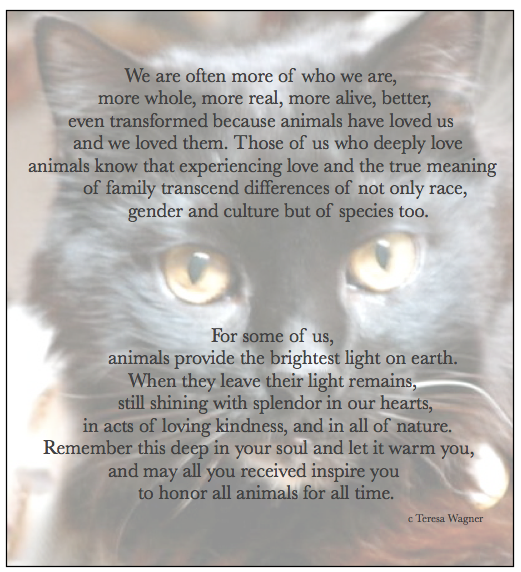
Teresa Whalen (formerly Wagner), Pet Loss Grief Support Pioneer and Program Founder—Educational and Professional Bio Background
Teresa earned a master’s degree in counseling from Villanova University and an undergraduate degree in psychology and criminal justice from Alvernia College, where she graduated magna cum laude. She also completed post graduate work at Columbia University, studied with Carl Rogers at the University of Nottingham, England, and completed the Clinical Training Program in Post Traumatic Stress Disorder at the National Center for PTSD, Dept. of Veterans Affairs. She continues her education in grief counseling and trauma with several classes each year with the Association of Death Education and Counseling.In the late 1970’s Teresa worked for the Juvenile Justice Center in Philadelphia, initially as a counselor for adolescents, then as a manager of a group home for adjudicated delinquent adolescents, and lastly as a trainer for the Center’s National Training Institute, teaching basic counseling skills. In the 1980’s, Teresa held a series of management positions with RCA in New Jersey and New York, heading training and organization development departments. It was during this period that she began her pet loss grief counseling work part time.
After moving to California in 1989, she facilitated bereavement support groups and grief healing workshops for a hospice in Salinas, California. As fulfilling as this work was, it became clear to her that her heart belonged with the animals and the people who needed help when they lost them.
Teresa has had a private grief counseling practice since 1986 and an animal communication counseling practice since 1991. She has worked with over 10,000 clients in over 21 countries. She is the author of the audio book Legacies of Love, A Gentle Guide to Healing from the loss of Your Animal Loved One and has created several other pet loss grief support resources. She is a contributing author in the books Animals in Spirit by Penelope Smith and Dolphins and Whales Forever edited by Takara Shelor.
She has studied flower essences with FES (Flower Essence Society), Perelandra and Desert Alchemy. In conjunction with FES, Teresa developed a flower essence formula, The Animal Relief Formula, to address the issues unique to the traumatic stress of animals. From 1999-2015 she facilitated annual whale swim trips to bring whales and people together in the ocean in sacred communication and love.
Teresa is passionately concerned about threats to whales and works privately with captive and entangled whales to help them with the emotional and physical stress and trauma inherent in these situations. She is also part of the activist movement to release captive marine mammals to seaside sanctuaries, or the ocean when appropriate. In addition, she is fervently concerned about the U.S. pet overpopulation epidemic, the trauma this creates for the animals, and the grief and compassion fatigue experienced by shelter and rescue employees as well. She has provided compassion fatigue workshops for shelters throughout the U.S.
Teresa has been named to Who’s Who of American Women, Outstanding Young Women of America, is the recipient of the RCA President’s Award, and an American Society of Training and Development Award for Outstanding Contribution. She has also received the Gwendolyn May Award for Humanitarian Work Extending Beyond Monterey County by the SPCA of Monterey County, CA.
She has been a regularly invited speaker to national conferences for organizations such as The Humane Society of the United States and The American Humane Association, and has been a speaker at an international conference of the Association of Death Education and Counseling. She has served on the faculty for The Assisi International Animal Institute and the Animal Spirit Healing and Education Network and served on the boards of Horse Power International, The Assisi International Animal Institute and is Past President of the Wildlife Auxiliary of The SPCA for Monterey County in California.
What matters most to her in life are the animals, being part of making the earth a better, safer place for them, and supporting the people who love, care for and mourn them. She continues to provide pet loss grief counseling sessions by phone, which she considers a great privilege. She lives in Carmel, California which to her is the most beautiful and peaceful place on earth.
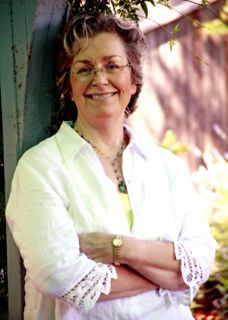 Ruah Bull, Ph.D.
Ruah Bull, Ph.D.
Ruah holds an M.A. in Counseling Psychology, M.Ed.in Humanistic Education and Ph.D in Transpersonal Psychology, as well as certificates in hypnotherapy, energy healing, aromatherapy and spiritual direction. Beginning in 1986, she has trained counselors, healers, intuitives and spiritual directors in counseling skills and professional studies, and has offered programs in peer counseling and communication skills in community, church, school and medical clinic settings.
In her roles as a helping professional, Ruah is devoted to honoring and serving “all our relations”—the animals, plants, stones and elements, that are our family, teachers and companions.
Ruah is an instructor in the Essential Counseling Skills class in this program. She lives and works in Northern California.
Read more about Ruah
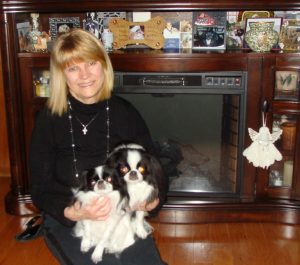 Donna Kahora, RN
Donna Kahora, RN
Donna has led a pet loss support group for over 16 years. She is the founder and sole facilitator of the Friends of Nikki Support Group, which was founded in 2001 and is located in Somerset, NJ. With Friends of Nikki, Donna provides a forum for pet parents who may benefit from peer-based support for pet loss at any stage. Donna brings the skills that she has gained from her 35 years as an RN, the completion of the Association for Pet Loss and Bereavement Pet Bereavement (APLB) Counselor Training, and her many years of studying the grief process. She is also a member of the Animal Concerns Ministry at St Matthias Church in Somerset, NJ
Donna co-facilitates the Pet Loss Grief Support Groups class in this program. She lives and works in Somerset, New Jersey.
Read more about Donna
Stephanie LaFarge, Ph.D.
Stephanie LaFarge is Senior Director of Counseling Services for the ASPCA. For 18 years, Dr. LaFarge has provided personalized support to people grieving the loss of their pet via her national 24-hour toll-free Pet Loss Hotline. Dr. LaFarge also assists owners and their children who are distressed by the prospect of the humane euthanasia of their companion animal. During the months that followed the terror attacks of September 11, 2001. Dr. LaFarge facilitated the remarkable contribution of more than 300 therapy dogs and their volunteer handlers. Thousands of hours of compassionate intervention were provided to families and First Responders at Ground Zero.
Dr. LaFarge received her doctorate in psychology from Teachers, College, Columbia University, and taught at Brown University.
Read more about Stephanie
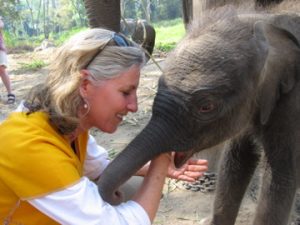
Enid Traisman, M.S.W.
Enid received her B.A. Degree from the University of Kansas in l980. In 1986 she completed her Masters in Social Work from Portland State University, specializing in Grief Counseling. In 1989 Enid became a Certified Thanatologist through the Association for Death Education and Counseling. In 2004 earned her certificate as a Compassion Fatigue Specialist through Humane Society University.
In October of 1986 Enid founded and continues as the director of the DoveLewis Pet Loss Support and Memorial Art Therapy Program. She facilitates four support groups each month and provides art therapy for the community and DoveLewis Emergency Animal Hospital staff. She is the author of My Personal Pet Remembrance Journal.
Enid co-facilitates the Pet Loss Grief Support Groups class in this program. She lives and works in Portland, Oregon.
Read more about Enid


